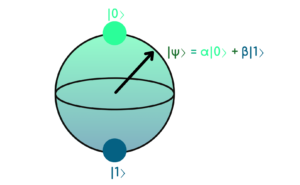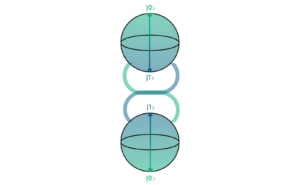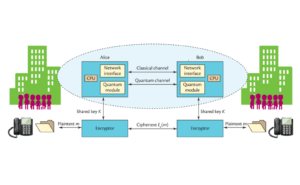
What are the Advantages of Quantum Computing?
Quantum computing is a rapidly advancing field that promises to completely transform the way we approach complex computational problems. So, what are the advantages of quantum computing and what are the advantages of quantum computing over classical computing? As we explore the world of quantum mechanics and the unique properties of quantum systems, it becomes increasingly clear that quantum computers possess distinct advantages over their classical counterparts. In this blog post, we will explore the top 5 advantages of quantum computing and why this technology is poised to transform industries and fields of study.
Advantages of Quantum Computing – Nº Exponential Computational Power
Exponential Computational Power
One of the most significant advantages of quantum computers are their ability to harness the principles of quantum mechanics to achieve significant computational speedup over classical computers for certain problem domains. Classical computers, based on the binary system of 0s and 1s, are limited in their ability to process information. In contrast, quantum computers utilise quantum bits, or qubits, which can exist in superposition, allowing them to represent and process multiple states simultaneously.

This quantum superposition enables quantum computers to perform certain computations at a much faster rate than classical computers. For example, quantum algorithms, such as Shor’s algorithm, can factor large numbers exponentially faster than the best-known classical algorithms. This advantage has deep implications for fields like cryptography, where the ability to quickly factor large numbers could potentially break current encryption methods.
Moreover, quantum computers can also excel at simulating complex quantum systems, which is crucial for advancements in fields like materials science, chemistry, and drug discovery. By accurately modelling the behaviour of quantum particles, researchers can gain deeper insights and accelerate the development of new materials, chemical compounds, and pharmaceutical drugs.
Do you feel like you need to know more about the basics of quantum computing before going further with this reading? Take a look at our article: Introduction to Quantum Computing for Dummies – A Simple Guide
Advantages of Quantum Computers – Nº Improved Optimisation and Problem-Solving
Improved Optimisation and Problem-Solving
Another key advantage of quantum computers is their ability to tackle complex optimisation problems more efficiently than classical computers. Many real-world problems, such as logistics, scheduling, and financial portfolio optimisation, can be formulated as optimisation problems. Quantum algorithms, like the quantum annealing algorithm, have shown promising results in solving these types of problems faster and more accurately than classical algorithms.
The quantum computer’s ability to explore a vast number of possible solutions simultaneously, a type of computational parallelism, thanks to the principles of quantum superposition and entanglement, is the primary driver of this advantage. By leveraging these quantum phenomena, quantum computers can navigate through the solution space more effectively, finding optimal or near-optimal solutions in a fraction of the time required by classical computers.

Quantum computing can be used to solve complex optimisation problems by leveraging the principles of quantum mechanics. For example, quantum annealing can be used to solve optimisation problems by simulating the behaviour of quantum systems by setting a Hamiltonian and letting the computer “drift” towards a global minimum. This approach has shown promising results in solving complex optimisation problems, such as the traveling salesman problem, more efficiently than classical algorithms.
Quantum computing can also be used to improve machine learning algorithms. For example, by utilising quantum machine learning, classification and regression tasks could be sped up significantly. This has significant implications for fields like artificial intelligence and data science, where the development of more accurate and efficient machine learning algorithms can enhance industries.
Advantages of Quantum Computing – Nº Enhanced Cybersecurity
Enhanced Cybersecurity
One of the most intriguing advantages of quantum computers are their potential to challenge the field of cybersecurity. Current encryption methods, such as RSA and elliptic curve cryptography, rely on the difficulty of factoring large numbers, a problem that classical computers struggle with. However, quantum computers can break RSA using Shor’s algorithm, which can factor these large numbers exponentially faster, posing a significant threat to the traditional encryption schemes.
To address this challenge, researchers are actively developing novel quantum-resistant encryption algorithms and provably-secure protocols. Post-quantum cryptography is a new discipline which develops classical algorithms that are computationally difficult to solve, even using an advanced quantum computer and are of great interest now despite quantum computing’s relative infancy to avoid harvest now, decrypt later data theft. Quantum cryptography, however, leverages the unique properties of quantum mechanics to create secure communication channels that are resistant to attacks from quantum computers and eavesdroppers, such as the quantum key distribution protocol, or QKD.

Source: IEEE Computer Society
One way that organisations can protect their data using quantum is through the quantum key distribution, QKD, protocol. This protocol is based on the principles of quantum entanglement and superposition, which allow two parties that are sharing information between them to detect any attempts at eavesdropping. The process involves encoding information in quantum states, such as photons, and transmitting them over a quantum channel. The receiver then measures the quantum states to determine if any unauthorised access has occurred. If the level of eavesdropping is below a certain threshold, a secure key can be generated. QKD has been shown to be provably-secure, with proofs based on information theory, and has been implemented in various protocols such as BB84, SARG04, and DPS. These protocols have been designed to address specific challenges and limitations, such as photon-number-splitting attacks and noise in the quantum channel.
New cryptography protocols, such as quantum-resistant algorithms (QRAs), can be used to create secure communication channels against quantum computers. Quantum-resistant algorithms are cryptographic methods designed to withstand attacks from quantum computers. These algorithms are developed to be secure against the threat posed by quantum computers, which could potentially break widely used cryptographic algorithms currently in use. Quantum-resistant algorithms rely on mathematical problems that are difficult for both classical and quantum computers to solve, ensuring that they will remain secure even when quantum computers become powerful enough to break traditional encryption methods. Examples of quantum-resistant algorithms include lattice-based cryptography and hash functions, which are being developed and standardised by organisations like the National Institute of Standards and Technology (NIST) to ensure the security of digital information in the face of emerging quantum computing threats.
By embracing quantum computing, organisations can potentially enhance the security of their data and communications, protecting against the looming threat of quantum-based attacks. As quantum computing continues to advance, the development of quantum-resistant encryption will become increasingly crucial to safeguarding sensitive information and maintaining the integrity of digital systems.
Advantages of Quantum Computers – Nº Sustainability
Sustainability
Quantum computing has the potential to affect the sustainability of various sectors, from agriculture to energy, by providing faster and more efficient solutions to complex problems and denotes another one of the key advantages of quantum computing over classical computing. This technology can contribute to a more sustainable future by reducing energy consumption, enhancing resource utilisation, and promoting environmentally friendly practices.
The energy efficiency of quantum computers is a significant advantage over classical computers. For instance, the 256-qubit neutral-atom computer from QuEra consumes less than 7 kW, which is less than 0.05 percent of the consumption of the powerful Frontier supercomputer. This means that if a quantum computer could perform just 5 percent of the tasks that Frontier does, it could result in dramatic cost savings from electricity and reduce energy consumption by nearly 10 gigawatt-hours per year. This is because quantum computers use fundamentally different processes to manipulate qubits compared to classical computers, which can lead to significant energy savings. For example, a quantum computer can solve certain problems using 50,000 times less energy than the world’s most powerful supercomputer. This energy advantage is critical for reducing the environmental impact of data processing, which currently accounts for approximately 460TWh of global electricity demand.

Quantum computers can also optimise resource utilisation, which is critical for sustainability. For instance, in agriculture, quantum computing can be used to optimise crop yields and reduce waste by analysing complex data sets more efficiently. This can lead to more sustainable farming practices and reduced environmental impact. Similarly, in the energy sector, quantum computing can accelerate the discovery of new materials and optimise energy storage, leading to more efficient and sustainable energy production and consumption.
Quantum computing can also help mitigate the environmental impact of data processing. The energy required for data processing is substantial, with a single deep learning algorithm producing the equivalent of 626,000 pounds of carbon dioxide, nearly five times the lifetime emissions of the average American car. Quantum computing can significantly reduce the energy demanded by data analytics by speeding it up to a fraction of the current time. This can contribute to a reduction in overall carbon emissions.
While quantum computing holds significant promise for sustainability, there are also challenges to be addressed. For instance, the cooling requirements for some quantum computers can be energy-intensive, which may offset some of the energy efficiency gains. Additionally, the development of quantum computing infrastructure and the training of professionals in this field will require significant investment and resources.
Advantages of Quantum Computing – Nº Improved Logistics Capabilities
Improved Logistics Capabilities
Quantum computing can revolutionise logistics and supply chain management by optimising complex networks and routes. By leveraging quantum algorithms and simulations, quantum computers can quickly identify the most efficient routes and schedules, reducing costs and improving delivery times dramatically. This advantage has significant implications for industries such as transportation, retail, and manufacturing, where efficient logistics and supply chain management are critical to success.
Quantum computing can be used to optimise logistics and supply chain management by leveraging the principles of quantum mechanics. For instance, quantum computers can be used to simulate the behaviour of complex networks and routes, allowing researchers to identify the most efficient routes and schedules. This is particularly useful in scenarios where traditional methods struggle to handle the complexity of large-scale logistics operations. By using quantum computers to simulate these systems, companies can optimise their operations to reduce costs, improve delivery times, and enhance customer satisfaction.
Quantum computing can also be used to optimise supply chain management by leveraging the principles of quantum mechanics. For example, quantum computers can be used to simulate the behaviour of complex supply chains, allowing researchers to identify the most efficient routes and schedules. This can be particularly useful in scenarios where supply chain disruptions are common, such as during natural disasters or global pandemics. By using quantum computers to simulate these systems, companies can optimise their supply chains to reduce the impact of disruptions and improve overall resilience.

The benefits of quantum computing in logistics and supply chain management are not insignificant. For instance, in the transportation industry, quantum computing can help optimise routes and schedules, reducing fuel consumption and lowering emissions. In retail, quantum computing can help optimise inventory management and supply chain logistics, reducing waste and improving customer satisfaction. In manufacturing, quantum computing can help optimise production schedules and supply chain logistics, reducing costs and improving product quality.
Conclusions: The 5 Advantages of Quantum Computing
As we have explored the top 5 advantages of quantum computing, it becomes clear that this technology has the potential to revolutionise various industries and fields of study. From exponential computational power to improved optimisation and problem-solving, enhanced cybersecurity, sustainability, and improved logistics capabilities, quantum computing offers a transformative approach to complex computational problems.
The exponential computational power of quantum computers can unlock new frontiers of scientific discovery and innovation. By simulating complex quantum systems, researchers can gain deeper insights into materials science, chemistry, and drug development, accelerating the pace of progress in these critical fields. Additionally, the ability of quantum computers to solve optimisation problems more efficiently than classical computers can have far-reaching implications for logistics, scheduling, and financial planning, leading to significant cost savings and operational improvements.
Furthermore, the potential of quantum computing to enhance cybersecurity through quantum-resistant encryption algorithms and protocols is of paramount importance in an increasingly digital world. As traditional encryption methods become vulnerable to quantum-based attacks, the development of quantum-secure communication channels will be essential for safeguarding sensitive information and maintaining the integrity of digital systems.
Equally significant is the role of quantum computing in promoting sustainability. By optimising resource utilisation, reducing energy consumption, and mitigating the environmental impact of data processing, quantum computers can contribute to a more sustainable future across various industries, from agriculture to energy production.
Thank you for reading our blog post on the top 5 advantages of quantum computing. We hope you found the information helpful in understanding the potential of this technology to transform various industries and fields of study.



